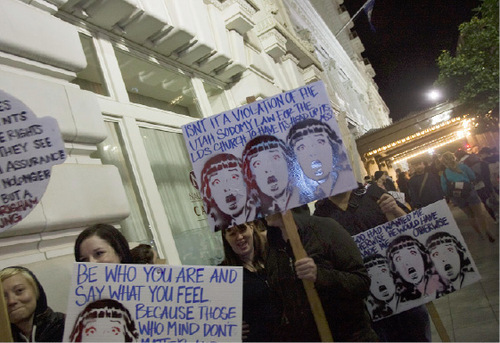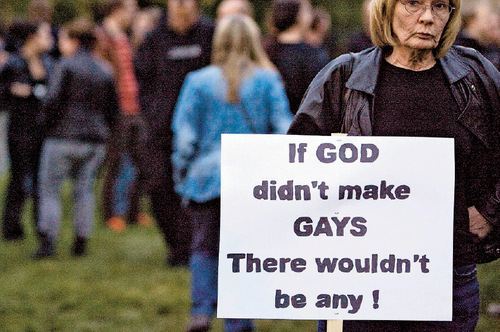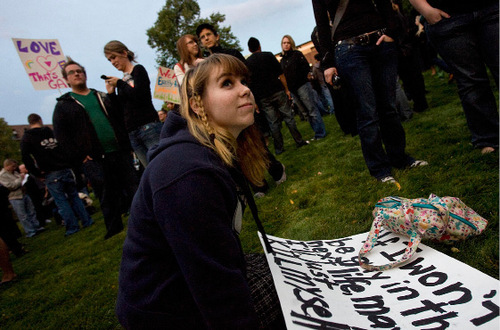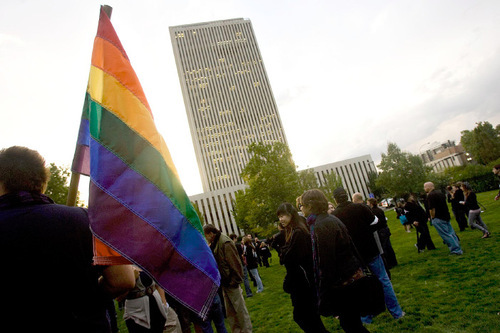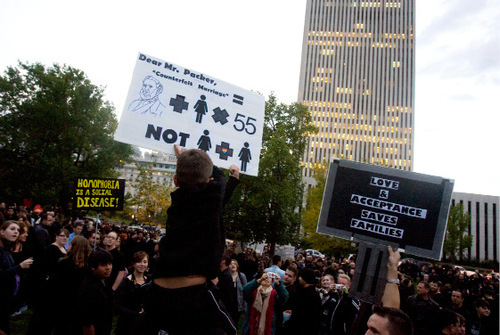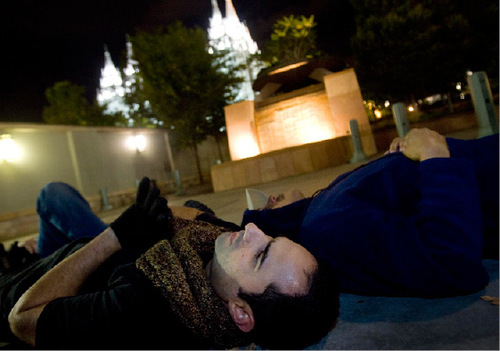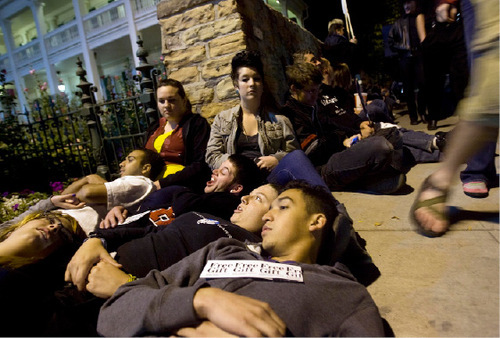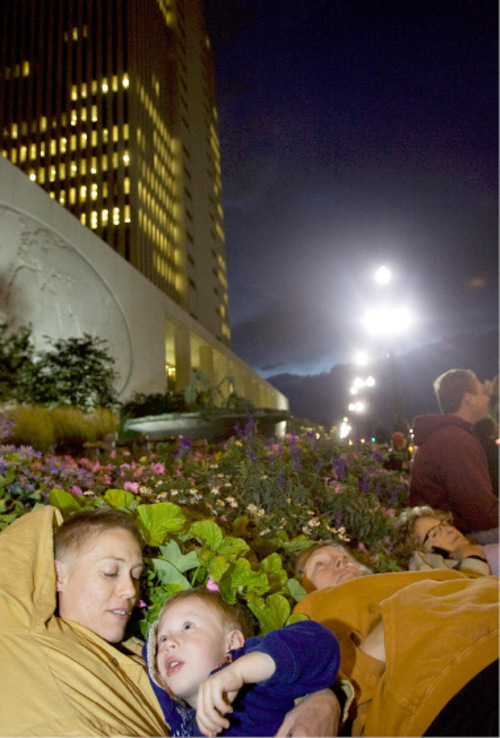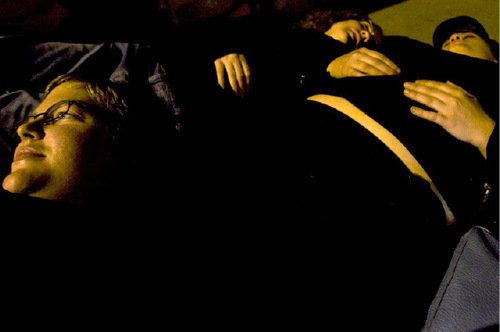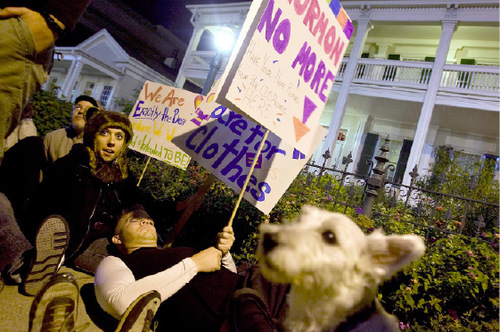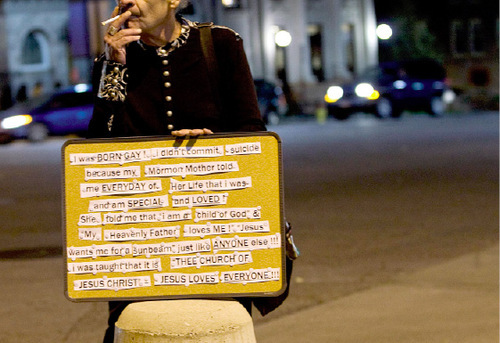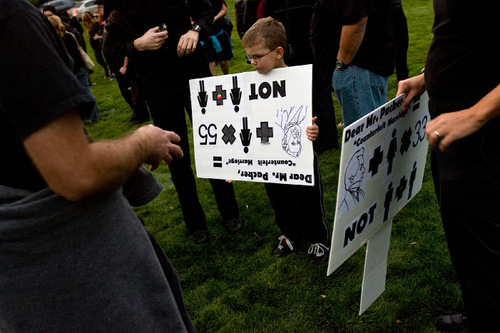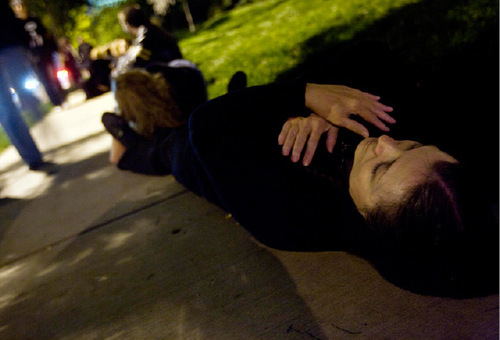This is an archived article that was published on sltrib.com in 2010, and information in the article may be outdated. It is provided only for personal research purposes and may not be reprinted.
Thousands of people ringed Salt Lake City's Temple Square on Thursday night to answer what they heard as hurtful words with a silent protest.
This week, LDS apostle Boyd K. Packer told millions that same-sex attraction is an "impure and unnatural" condition that can be overcome. Members and supporters of Utah's lesbian, gay, bisexual and transgender community worry such a message could add to the emotional distress that youths often experience as they come to terms with being gay.
Packer's speech, delivered during the LDS Church's 180th Semiannual General Conference, hit a nerve, protesters say, because it came after a string of gay teen suicides in the national news. Boys as young as 13 took their own lives after reportedly being bullied by their peers for being gay.
On Thursday, protest organizers estimated that 4,500 people ringed the two downtown blocks that make up the LDS Church's headquarters. Participants wore black, and some carried signs. Lying head to toe or sitting shoulder to shoulder, they encircled Temple Square two times.
"Tonight, we are symbolic of all the children who have been killed by messages like Boyd K. Packer's," said organizer and Salt Lake City blogger Eric Ethington. "When you hear nothing from [church leaders] but that you are nothing but evil and you need to change the unchangeable nature of yourself, that is only a message kids can take for so long."
In response to the protest, LDS Church spokesman Scott Trotter said the faith's doctrine on marriage and family is based on "principles of respect and love for all of God's children."
The church opposes gay marriage and teaches that members who are attracted to the same sex shouldn't act on those attractions. It has endorsed Salt Lake City ordinances that guard against anti-gay discrimination.
"We have continually emphasized that there is no room in this discussion for hatred or mistreatment of anyone," Trotter said in an e-mail. "The church recognizes the right of groups to voice their opinion in the public square."
Kannon Berge, who attended Thursday's protest, said he was there to let young LGBT Utahns know they aren't alone. Berge, 22, grew up in Santaquin and told his friends he was gay when he was 16. But he waited four more years to tell his LDS parents.
As a Mormon teen, Berge said he tried dating girls and eliminating his attraction to men. But it didn't work.
"I was most upset by the fact that [Packer] said we can change," Berge said. "It gives kids hope. Then when they realize they can't change, they're depressed. They might feel like taking their lives is the only option."
Last year, the American Psychological Association passed a resolution advising mental health professionals against telling clients they can change their sexual orientation through therapy or other treatments. No solid evidence exists that such efforts work, the APA concluded, and some studies suggest a potential for harm.
LGBT youths who experience high levels of family rejection are eight times more likely to attempt suicide, six times more likely to experience depression and three times more likely to use illegal drugs than those who don't, according to a 2009 report in the medical journal Pediatrics.
One of the rejecting behaviors measured was telling a child to change.
On Thursday, the Utah Pride Center, gay Mormon support group Affirmation and national gay-rights heavyweight The Human Rights Campaign again demanded that Packer "correct" his "inaccurate and dangerous" statements.
Patty McClellan, a 44-year-old Murray resident, attended the protest with her husband and daughter. She called the demonstration the "perfect venue to say we're all the same."
"There are heterosexual families like ours. There are lesbian families and gay families," she said. "It doesn't matter what anybody else says. It's all about love."


